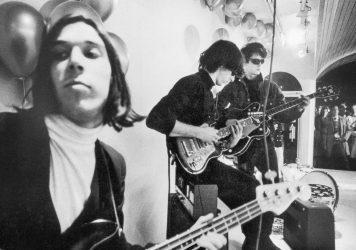The "Quasar of Rock" is the subject of this juicy and insightful documentary which prizes deep cultural analysis over the usual bobbysoxer hysteria.
Without unduly denigrating the achievements of Richard Wayne Penniman, – or, the artist formerly known as Little Richard – there was a perception that he was a one-of-a-kind musical firecracker who dined out on a small clutch of classic tunes for nearly 70 years.
Unlike many of his jaded peers, Richard was someone who would blast out ‘Good Golly Miss Molly’ in 2006 with the same intensity and passion as he did in 1956. What you might read from this is that he was supremely proud and protective of his cultural legacy, and Lisa Cortes’ new profile documentary, Little Richard: I Am Everything, says, correct – and he has every right to be.
Things begin with a customary love-in as a gaggle of rock ‘n’ roll dinos take turns to laud Richard and his formative innovations in the field of Rock ‘n’ Roll. Yet the film seems to want to get that hagiographic stuff off the table quickly in order to mount a more in-depth and analytical take on the Little Richard story – one which aligns more neatly with his famously-licentious 1984 memoir, ‘The Life and Times of Little Richard: The Quasar of Rock’.
Celebrity fans are nudged to the side in favour of contributions from a number of cultural historians and academics who are able to contextualise Richard’s strange journey and explore the wider ramifications of his work with much more originality and objectivity. It’s refreshing to see a film like this which opts for an editorial line that’s not just wall-to-wall celebration, and actually attempts to dismantle and dissect its subject rather than merely lionise him to the hilt.
It’s an added bonus that Little Richard had such a long and eventful life (a massive understatement), the main seam of which seems to be an extended tussle with sexual self-identity. One minute he’ll be asking his production team to make him into a flaming icon and be sure that all his gaudy stage costumes contain frills, tassels and mirrors. The next, he’ll be on a TV chat show in his new formal guise as an evangelical pastor dropping homophobic clangers such as, “God made Adam and Eve, not Adam and Steve.”
There’s always a sense, however, that Richard was attempting to find some diplomatic middle ground where his private life and the image he projected didn’t disrupt his art – especially as a way for him to make money. He was a joker and a teaser, and even though he constantly claimed that he’s not “contrived,” there’s something that feels expertly stage-managed and precise about how he presented himself to the public. It may be a cliché to site the clown who’s crying on the inside, but it’s not far off…
Praise, too, goes to the film’s decision to use Richard as an example of how the work of Black innovators was often plundered and repackaged by white counterparts who inevitably managed to parlay it into much more successful careers. It’s hardly a revelation to be told how much The Beatles or The Rolling Stones were influenced by their love of Black music, but the film makes the case for this form of cultural smash-and-grab as being endemic, and it wasn’t just Little Richard who was being ripped off.
These welcome diversions into musicology dull the acid bitterness of difficult scenes from Richard’s later years. It seems that however hard the industry worked to make amends and give him his just desserts, he rightly pinged back their platitudes and asked the question: why are you doing this now? And what is the real value of all of this? Is this to make you look good, or me? His avuncular façade and glib repartee go some way to mask some of his clear frustrations, but it’s certainly understandable that he would use these platforms as a way to reflect the hypocrisy of his peers right back at them.
Little White Lies is committed to championing great movies and the talented people who make them.
Published 27 Apr 2023
Another music icon receives their mandatory movie profile.
Richard’s amazing life is examined with rare objectivity and insight.
No real formal innovation to make this one worth of the repeat viewing pile.

By Ed Gibbs
This multi-sensory look at David Bowie’s life and career is an all-consuming affair that explores and safeguards the man’s legacy.

Baz Luhrmann’s sweaty, opulent take on the King of rock ’n’ roll is not a biopic but a fairy tale.

Todd Haynes directs this definitive chronicle of the fabled avant-garde rock group, taking in everything from doo wop to pop art.